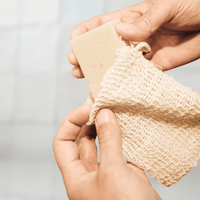
Even if you already purchase all of your clothes from thrift stores, use low waste shower products, and work with what you already have, there may be one area in your life that could become a little more sustainable: grocery shopping and cooking. Single-use plastics sneak their way into the packaging of many foods and dining halls or other on campus vendors. With these tips, you’ll be equipped to reduce your plastic usage!
Sustainable grocery shopping does not have to be inaccessible or expensive. One of the simplest ways to avoid buying plastic-wrapped produce is to use our organic cotton mesh produce bags. Produce in plastic bags or containers often spoils quicker. Additionally, bags of pre-packaged produce are often too large for the average person to finish before the entire bag spoils. Bring a set of produce bags to the store so you can purchase the exact amount of produce that you need while reducing your plastic waste.
Bulk food shopping is another way to skip plastic bags and use your own containers instead. Many grocery stores have bulk food sections where you can buy seeds, grains, nuts, and more. Bulk shopping saves you time and can often save you money in the long run too!

For certain items such as coffee, chocolate, snacks, and more, look for a Fair Trade Certified seal. This certification means that the product meets certain standards including “safe working conditions, environmental protection, sustainable livelihoods, and community development funding.” Most food labels do not disclose information about labor standards or sustainability, so shopping Fair Trade is a way to ensure you’re supporting companies that care about their workers and the environment.
If you primarily eat the dining hall or from other vendors on campus, bring your own utensils with you! Most vendors give out plastic utensils that aren’t the most environmentally friendly. To make sure you’re always prepared, pack our reusable bamboo utensils in your bag! These utensils come in a convenient carrying case and prevent plastic utensils from piling up in the landfill!

All of these small changes can make a big difference in reducing your plastic consumption. When in doubt, there are some more general tips we like to live by to lower the carbon footprint of our plates and grocery carts. The first tip involves incorporating more meatless meals into your week. According to this New York Times article, 50 grams of protein from beef can produce 17.7 kilograms of CO2 while the same amount of tofu and beans produces less than one kilogram of CO2. Fortunately, more dining halls and restaurants offer meatless options. If meat free options are not as available to you, make that known to your campus’s dining services.
If you grocery shop and cook for yourself, try to purchase products packaged in paper or glass! Plastic production requires the use of fossil fuels and is more likely to pollute the environment. Meanwhile paper can be easily recycled and glass containers can be reused for food storage!
Don’t let living a more environmentally conscious lifestyle seem like a chore. By paying more attention to your plastic usage, the brands you support, and how much meat you consume on a weekly basis, you can become more aware of your impact.





